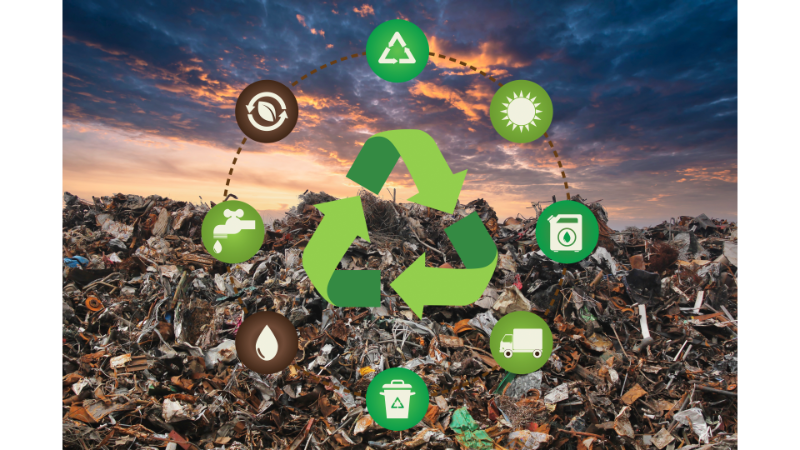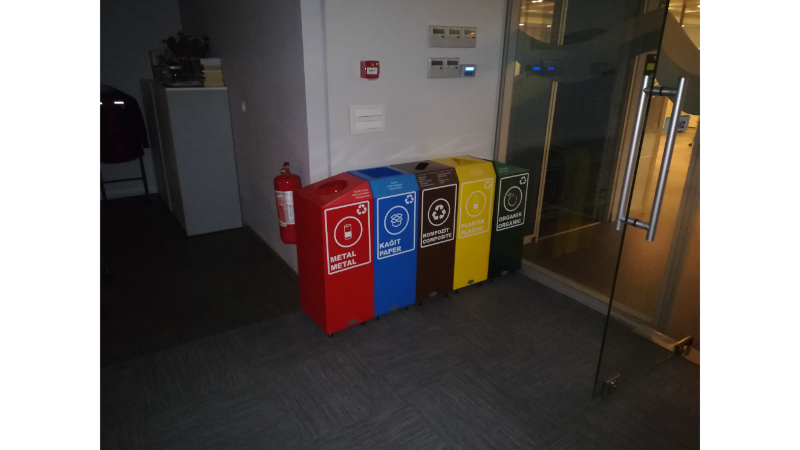Environmental sustainability is of great importance for every sector in today’s world. Increasing population, industrialization and consumption habits lead to rapid depletion of natural resources and an increase in the amount of waste. This situation leads businesses and individuals to seek more environmentally friendly solutions. Zero waste management is a holistic approach that aims to separate waste at its source. It also focuses on minimizing environmental impacts.
Zero waste management offers not only environmental benefits, but also economic and operational advantages. Reducing waste, increasing recycling rates and promoting conscious consumption habits ensure efficient use of resources. Especially for large-scale enterprises, the transition to this waste system supports compliance with legal requirements. It also helps create an environmentally friendly image by increasing brand value.
Burkasan has been providing comprehensive waste management services to prestigious brands across Turkey for more than 25 years. It contributes to the achievement of their waste targets. It supports the implementation of environmental policies.
In this article, we will discuss the concept of zero waste and how it is implemented. We will also examine the importance of zero waste bins and the recycling process. Through all these topics, we will evaluate how a waste management model can be created.
Table of Contents
- What is Zero Waste?
- How to Ensure Zero Waste Management?
- Recycling and Zero Waste
- Zero Waste Projects
- Importance and Uses of Zero Waste Bins
- BURKASAN and Integrated Waste Management Solutions
- Frequently Asked Questions (FAQ)
- Conclusion
What is Zero Waste?
Zero waste is an environmental policy that aims to minimize waste generation and maximize recycling by separating waste at its source. This approach aims not only to eliminate waste, but also to prevent waste generation in the first place. The rapid depletion of natural resources is a growing problem. Increasing environmental pollution and climate change also contribute to this issue. These challenges highlight the importance of waste management. These issues show that effective waste management is of vital importance. For this reason, everyone from individuals to large enterprises should adopt a zero waste approach.
It is based on certain principles. Firstly, it is crucial to avoid unnecessary consumption to minimize waste generation. Therefore, choosing unpackaged products, avoiding single-use plastics and conscious shopping are among the most effective ways to reduce the amount of waste. Secondly, it is important to recycle and reuse used materials. Using refillable water bottles is part of this principle. Opting for cloth bags also supports this approach. Donating or repurposing old clothes further contributes to waste reduction.

Another important principle is recycling. Reprocessing end-of-life materials such as paper, plastic, glass and metal into raw materials helps to conserve natural resources.
In addition, turning non-recyclable waste into energy is also part of zero waste. This method reduces landfills and creates an important source of electricity and heat energy. Finally, waste that cannot be recovered must be disposed of without harming the environment. Special wastes, such as hazardous and medical wastes, must be disposed of using specific methods. These methods ensure that the environment is not harmed.
How to Achieve Zero Waste Management?
In order to ensure effective waste management, it is necessary to prevent waste generation. Waste should be separated at the source. Recycling systems must be used effectively. Proper disposal methods should also be applied.
The conscious involvement of businesses and individuals in this process is essential. It ensures that environmental impacts are minimized. It also helps resources to be used more efficiently.
Steps to Implement for Zero Waste Management
- Waste Analysis: It is important for businesses and individuals to determine the amount and types of waste they generate in order to create an efficient waste management plan. This analysis shows which waste can be reduced and how recycling processes can be optimized.
- Source Segregation: Sorting plastic, glass, metal, organic and hazardous waste into the right categories increases recycling rates. This process forms the basis of waste management in both individual consumption and corporate activities.
- Education and Awareness Raising: Raising the awareness of employees and society on zero waste is a critical step for the successful implementation of waste management. In-house trainings and public informative activities contribute to the dissemination of zero waste culture.
- Waste Tracking Systems: For large-scale enterprises, it is possible to manage the process more efficiently by using digital waste tracking systems. These systems make it easier to monitor the amount of waste, evaluate recycling rates and make operational improvements.
- Collaborations and Supplier Selection: In order to achieve zero waste targets, working with companies specialized in waste management provides a great advantage. Companies that offer professional waste management solutions support the optimization of recycling processes. They also contribute to the development of energy recovery systems. Additionally, they help ensure compliance with environmental standards.
Waste management is not only an environmental necessity, but also a strategic process that offers significant economic and social benefits. By adopting waste management principles, businesses and individuals can contribute to the protection of natural resources. They can also help build an environmentally friendly future.
Recycling and Zero Waste
Recycling is one of the most critical components of the zero waste process. Needs to be implemented effectively to minimize the environmental impact of waste and ensure waste management. The zero waste approach focuses on preventing waste generation. Recycling ensures that the waste that inevitably arises is brought back into the economy.
In order for this management to be successful, it is crucial to expand recycling systems, separate recyclable wastes correctly and raise public awareness. Municipalities strengthening their recycling infrastructure makes waste management more efficient. Businesses shifting towards production models reduces environmental impacts. Individuals contributing to recycling in daily life helps reduce the amount of waste. All these steps play a critical role in achieving waste targets.
Zero Waste Projects
Zero waste projects are sustainability-focused initiatives developed to ensure efficient use of resources, prevent waste generation, and increase recycling rates. These projects can be implemented at all levels—from individuals and schools to government institutions and the private sector.
- Zero waste practices in schools: Students are introduced to sustainable living at an early age through recycling bins, compost systems, and environmental awareness programs.
- Municipality-supported community recycling systems: Neighborhood-level collection stations help separate plastic, glass, paper, and organic waste.
- Waste management in workplaces and factories: Aims to minimize waste generated during production and reintegrate materials into the supply chain.
- Composting and organic waste projects: Promotes the transformation of household organic waste into compost for agricultural use.
- Smart waste collection systems: Technology-driven solutions enable proper collection and reporting of waste data.
Zero waste projects contribute to raising environmental responsibility while also offering long-term economic benefits.
Importance and Usage Areas of Zero Waste Bins
It is an important tool that makes recycling processes more efficient by ensuring the correct sorting of waste.
Types of Zero Waste Bins:
- Plastic Waste Bins
- Paper and Cardboard Waste Bins
- Glass Waste Bins
- Metal Waste Bins
- Organic Waste Bins

Each of these bins should be used to ensure the correct management of specific waste types.
BURKASAN and Integrated Waste Management Solutions
Burkasan offers integrated waste management solutions to businesses across Turkey. In this way, it ensures more effective implementation of zero waste systems. At the same time, it contributes to building an environmentally friendly future. With its team specialized in waste management, it helps companies manage their waste in the most efficient way. It also encourages environmentally friendly practices.

Burkasan offers waste management consultancy, training programs, optimization of recycling processes and sustainable waste infrastructure solutions for businesses to achieve zero waste targets. They develop waste tracking systems especially for large-scale production facilities and retail businesses. In this way, environmental impacts are minimized.
Waste management is not only a necessity. It is also a process that provides long-term economic and prestige advantages to businesses. It makes waste management more effective by offering efficient and environmentally friendly solutions to companies. Systems that encourage the separation of waste at source make recycling processes efficient. Energy recovery solutions support energy utilization. Regular disposal methods ensure waste management without harming the environment. These practices help businesses reduce their carbon footprint. It also supports them in transitioning to environmentally responsible production processes.
Frequently Asked Questions (FAQ)
How is the zero waste system implemented?
It is implemented by sorting waste at source, effective use of recycling processes and adoption of disposal methods.
Why is the use of zero waste bins important?
It ensures that waste is sorted into the right categories and accelerates the recycling process. Contributes to more efficient waste management.
What is the difference between recycling and zero waste?
Recycling refers to the reuse of waste. Zero waste, on the other hand, is a broader approach that aims to minimize waste generation.
How can businesses transition to a zero waste system?
Businesses step into the process by getting waste management consultancy. They can raise awareness by training their employees on this issue. They can also transition to a zero waste system by strengthening their recycling infrastructure.
Which materials does recycling cover?
Many materials such as paper, plastic, glass, metal, organic waste and electronic waste can be recycled. However, since each material has a different recycling process, it is important to separate them correctly.
What are the environmental benefits of zero waste management?
It ensures the protection of natural resources. Reduces environmental pollution and reduces carbon footprint. It also creates a sustainable living space by saving energy.
What are waste tracking systems and how do they work?
Large-scale businesses and municipalities use waste tracking systems. These systems allow to monitor the amount of waste generated. At the same time, it helps to optimize recycling processes. Thanks to digital systems, waste management is carried out more efficiently.
Conclusion
In conclusion, ensuring environmental sustainability is of great importance. This goal can be achieved through the efficient use of resources. It also requires reducing waste generation and increasing recycling rates. It is essential for businesses to take an active role in this transformation. This not only reduces environmental impacts. It also increases operational efficiency, ensures legal compliance, and strengthens brand image. Adopting practices such as energy recovery, reuse, and circular production is crucial. These practices provide significant benefits for both nature and the economy.
To leave a better world for future generations, waste should be separated at its source. Consumption habits should be reviewed, and eco-friendly policies must be implemented. At this point, zero waste is not just an environmental policy. It is also a comprehensive sustainability approach that offers economic, social, and institutional benefits. It is important for every individual and business to be part of this process. This participation increases environmental awareness and contributes to building a cleaner and healthier future. Every step taken with the zero waste vision opens the door to a life in harmony with nature.
If you want to review our other articles, you can browse our blog page.

